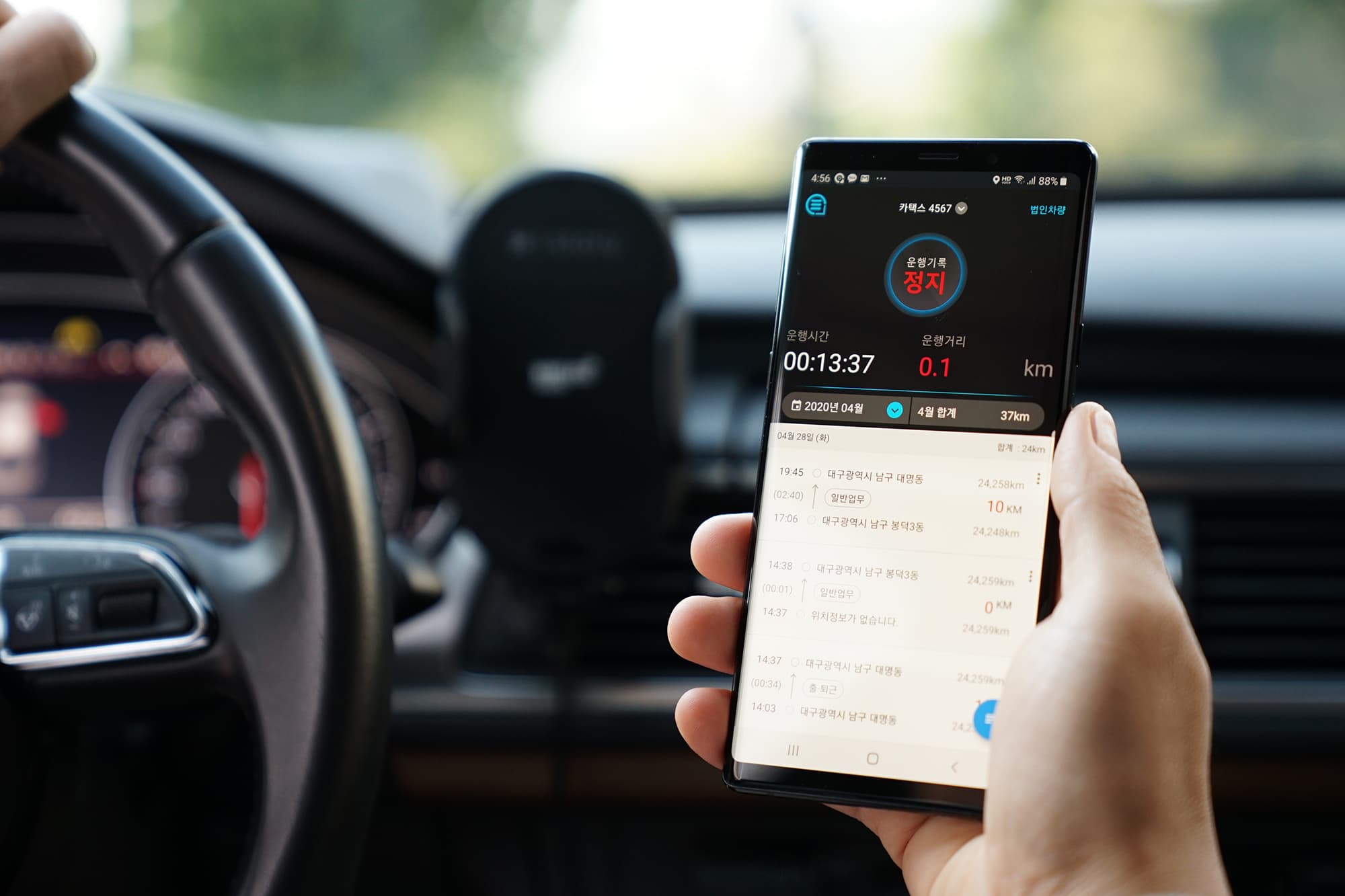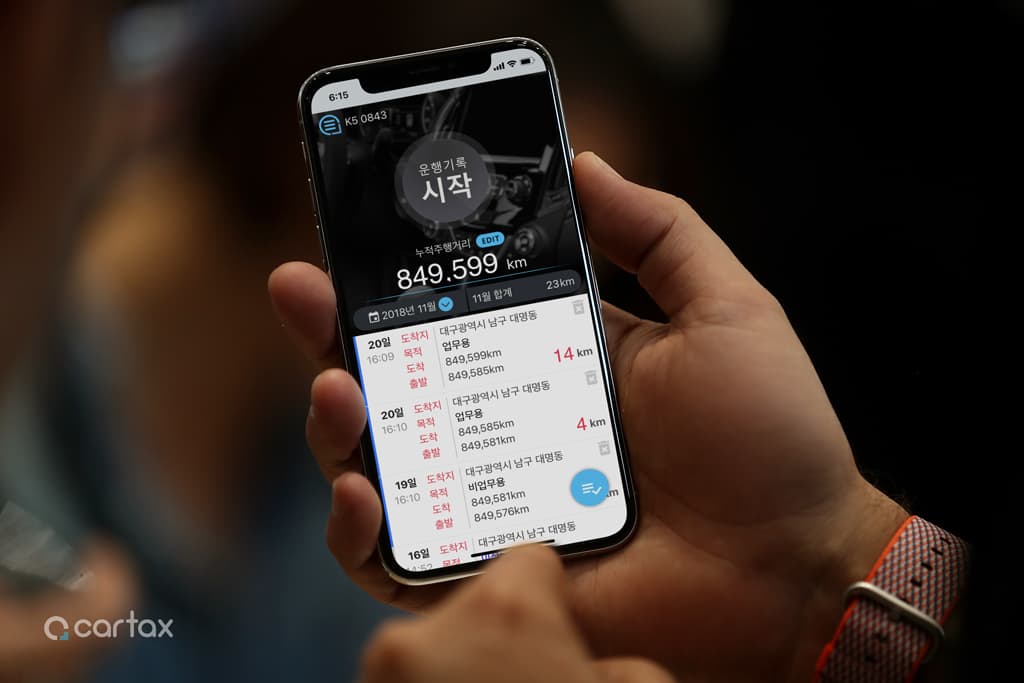1. Overview of Cartax
Founded in March 2017, Cartax is a mobility startup that helps the users to record usage logs and maintain their business vehicles using GPS on their smartphones.
Before Cartax was launched, people had to manually write their vehicle usage logs or install a GPS tracker to their vehicles.
Cartax starts writing vehicle usage logs automatically once the user starts the car and the system allows the user to calculate fuel expenses based on the actual driving distance on the web administrator page.
The vehicle usage logs are saved in the same format used by the National Tax Service and because Cartax fully meets the requirements set by National Tax Service’s amended tax law for business vehicles, many companies are able to save taxes using Cartax.
Using Cartax increases work efficiency by removing inefficient process in maintaining business vehicles and saves the companies costs by allowing them to accurately calculate fuel expenses based on the actual driving distance.
2. Company Background
We first started planning this business in January 2016 after seeing a press release on National Tax Service’s amended tax law for business vehicles. The gist of the statement was that it’s now become compulsory for businesses to record usage logs for business vehicles to claim a deduction for business-related car expenses amounting to more than KRW 10 million a year. Before our product was introduced to the market, businesses had to install a GPS tracker to their vehicles in order to record vehicle usage logs automatically. These small GPS trackers attached to vehicles were trackers pivoted from personal trackers used for evidence securing purposes and could not effectively protect the privacy of the users. Also, businesses had to sign carrier contracts to use these trackers. Not only that, the purchase options were too complicated and sales workers opposed to installing these trackers because they did not trust the trackers to keep their personal information safely. It’s difficult to record vehicle usage logs during busy work hours and small-to-medium sized businesses that cannot afford to employ company drivers were having a difficult time keeping their vehicle usage logs up to date. So, to enable the business to record vehicle usage logs simply using a smartphone, we started this business.
3. Cartax’s Strengths and Differentiating Factors
Telecom carriers offer similar services but mostly they require you to install a tracking device to your vehicle and you have to sign a service contract. This is not how Cartax works. The differentiating factor of Cartax is that Cartax doesn’t require any additional recording device and all of the services are provided based on the actual driving data. Businesses can save costs because they do not have to purchase a separate tracker and even when a vehicle has to be replaced after an accident or for maintenance, the user can easily access Cartax without having to remove and re-install a tracker because Cartax simply doesn’t use a separate tracker.
4. Most Memorable Moment?
The tentatively named “Vehicle Operation Log Book” app made in 2016 was finally launched after a year in the name “Cartax”. Our operations team had suggested the name by combining the words “Car” and “Tax” and it was probably our first thing we unanimous agreed upon. We promoted the product by using the phrase “Hometax for Tax, Cartax for Tax Saving”, intentionally mentioning National Tax Service’s Hometax, a tax administration service widely used in Korea. And because of this phrase, there are still people asking us whether Cartax is owned by National Tax Service. Because of the press release on National Tax Service’s amended tax law for business vehicles and that promotional phrase we used, many people started using our product and the number of concurrent users during rush hours passed 100 only 1 week after launching our service. It was a very meaningful experience for us because we had not spent a penny on advertising until the number of concurrent users passed 100.
But not everything went along perfectly. Right after incorporating our business, we were selected for Korea Credit Guarantee Fund’s First Penguin Program and received a significant amount of credit guarantee but we made a big mistake of thinking that the loans we had were enough. After some time, we’ve managed to recover but thinking back, we feel bad for unnecessarily expanding the workforce too early before establishing a proper system and wasting too much resources and time on areas that are irrelevant to our goal.
5. Business Accomplishments
We’ve won the Presidential Award at the Startup Competition and many other awards but the biggest achievement for us recently is us reaching our break-even point. Cartax is currently used by 70,000 businesses including major companies with the total accumulated vehicle usage logs at 33 million. 900,000 km of driving distance is recorded every day and the total driving distance recorded is around 770 million km. This is equivalent to traveling 19,300 laps around the Earth. And excluding navigation services in Korea, we have the largest database of business vehicle usage logs. Recently, we’ve been selected as a supplier for Ministry of SMEs and Startups’ “K-Voucher Project”, a project for building a platform that connects telecommuting service providers and demanders. Also, since 90% of our service fees are supported by the government, increasingly more companies are starting to adopt our service.
6. What Inspires You While Running a Business?
Meetings with our clients. Major companies and companies from various sectors are showing so much interest in our service and want to use our service for their businesses. We are learning and experiencing a lot by finding balance between management’s perspective and sales department’s perspective and seeing businesses’ different ways of working and corporate cultures.
7. Advice for Those Preparing to Start a Business
Hang in there. I know its tough but hang in there in any way you can as long as you’re keeping it legal and ethical. All startups go through a hard time in the beginning. A startup literally means a newly started business. Just think that anything can happen when you start a journey. We don’t know what kind of advice we can give you but we just want to say that we are also trying to hang in there.
8. What Are Your Business Plans and Vision for the Future and Your Thoughts on ZER01NE?
In the short term, we are trying to launch a personal vehicle management service and enter into the automotive aftermarket using the 40,000 vehicle usage logs accumulated daily in our database. Our mid-to-long term goal is to use the capabilities we’ve built in the Korean market to enter markets overseas. Also, after examining our capital, we might prepare for an investment round next year. ZER01NE allowed us to find solutions to the accuracy problem of our vehicle usage logging system and it gave us an opportunity to grow and learn from collaborations with Hyundai Motor Group and Kia Motors.
9. Anything Else You Want to Say?
We are a bit different from other startups. Self-sufficiency is our first priority running a business. Instead of choosing investments, we chose loans and we didn’t think about anything else than generating revenue because we simply had to survive. Instead of preparing for an investment round, we worked day and night to increase the quality of service and generate revenue. We ran our business thinking that the most important thing is to establish a foundation for sustainable growth. It’s quite tough to run an app service outside Seoul but strangely, ever since throwing away the expectation that running a startup is easy, we have been more relaxed and brave in facing hardships and problems. I personally want to thank my former team members and also my current team members for their work.




